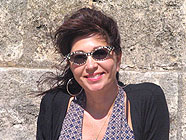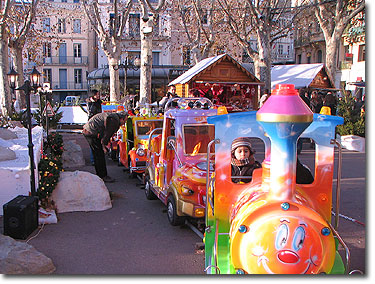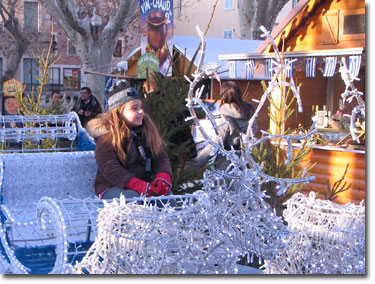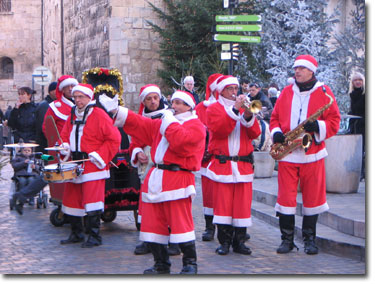 |
| The Independent Traveler's Newsletter PAGE SIX |
 |
| The Independent Traveler's Newsletter PAGE SIX |
| Notes from Narbonne . . . Narbonne: How can I miss you if I don't go away? |
by Marlane O'Neill
  Narbonne
is as charming as ever during the end of year festivities with unseasonably
chilly, below-freezing temperatures in December. The cold just adds more
spirit to the log house village selling sparkling presents and treats to
eat, the ornate merry-go-round, the tiny choo-choo train and the large,
elaborate white plastic ice rink lit up in bright neon colors in the Place
de la Mairie. Tourists from all over France crowd the city and we are almost
back to our summertime swells of visitors. Our little chambre d'hôte
is complet for most of the month of December. We are surprised
but pleased. Narbonne
is as charming as ever during the end of year festivities with unseasonably
chilly, below-freezing temperatures in December. The cold just adds more
spirit to the log house village selling sparkling presents and treats to
eat, the ornate merry-go-round, the tiny choo-choo train and the large,
elaborate white plastic ice rink lit up in bright neon colors in the Place
de la Mairie. Tourists from all over France crowd the city and we are almost
back to our summertime swells of visitors. Our little chambre d'hôte
is complet for most of the month of December. We are surprised
but pleased.
Les Halles, our indoor farmers' market – and the oldest continually running one in France for the past 106 years – is constantly putting on different types of entertainment in the month of December. Lottos, musical acts, impromptu parties and raffles continually buzz in the center of the market. There are several restaurants, most offering red meats (including horse), but we prefer les coquillages or the oysters and shellfish. We have our own favorite seafood and wine restaurant which features fresh oysters, delicious fragrant white wines from La Clape (the nearby nature reserve) and calamari (squid) a la plancha. A delicious way to enjoy lunch any day. A young man, his wife and their 12 year-old son serve the crowded tables with charm and a great sense of humor. You need a sense of humor to eat here as you will find yourself elbow-to-elbow with your neighbor. This means that most of the time someone will end up spilling a plate, a glass or just wearing some of their meal. It's okay - just don't wear your best clothes – they'll most likely end up at the cleaners! We have managed to keep ourselves from any serious spillage or loss of food, but we've had our share of garlic butter and wine stains.   In an abrupt about face, January finds us gliding into an unseasonably warm month with temperatures around 23 degrees Celsius (almost 70 degrees Fahrenheit). Oo-la-la, the coats are stripped off and the Narbonnaise stroll town center in T shirts. Due to the beautiful sunny warm days, we find the city much more crowded than usual, and it seems as if the holidays continue with the restaurants and shops filled to capacity. However, because of the unseasonably cold weather late in 2010, we started to get worried about the coming winter months. Thus we made sure to stock up on firewood! Our
friendly local firewood provider saw us for the first time around the beginning
of December. We are taking no chances and decide it is time for the monthly
haul of several hundred pounds of wood. We hand Sebastian a Christmas box
of chocolates to thank him for his kind and friendly service - not to mention
the fact that his wood is about half the price of the wood for sale at
the bricomarché. This is our second year of getting wood
from him regularly, and we appreciate his prices and good nature. The response
is an invitation to their Christmas party - that we called with glee the
'woodcutter's ball' - on Christmas Eve the following week!
We accept with enthusiasm. It is not every day that one gets invited to
a true Narbonnaise celebration.
So, here we are in the second week of January, and we have gone from nearly freezing to...20 degrees Celsius? Yes, we are balmy, sunny and almost warm in the beginning of January. Much warmer than we were last year at this time. The end of holidays in France is not New Year's Eve but the day of the Epiphany, January 6th, when French people eat a large round pie called Roi de Gallettes made of mille-feuille pastry and stuffed with almond paste and/or apples. Somewhere in the confection is a tiny ceramic trinket made in the shape of a soldier, a boat, an animal or...positions in the Kama Sutra? Yes, a baker in Paris decided to make this year's 'theme' for his Roi de Gallettes people in various poses of the Kama Sutra. I presume it is for adults-only but on sais jamais. The person who has the good fortune to bite their teeth on the little ceramic statue is said to be in line for having luck with money in the coming year. No, not sex, money. It is a very popular custom in France to serve this treat, and people invite each other to partake in their homes or place of work. My French teacher remembers games that were played in her Narbonnaise youth to make sure that the gallette is served fairly. One game is to put a child under the table who calls out the name of the person to be served the next slice, in no particular order. That way there is no cheating on who gets the trinket and thus the good luck for the coming year. I have kept the little toy soldier that I found in my piece of pie 20 years ago in my change purse. Did it bring me luck with money – I can only say that I haven't lost the change purse! So, with the spring like weather, I decide to try to round up some workers for the minor handyman jobs that need doing in our building. Things like tuning up the front door lock, putting a fresh coat of paint on the interior door, getting a quote on the installation of a new sonnette, some minor electrical work, etc. Now that the holidays are over I should be able to find people who want to work, right? When you look at the typical French person's calendar you see a lot of holidays and vacation time - much, much more than you would see on an American or English person's agenda. Thus, there are many times when it is impossible to get service, a worker or a contract. That is because they are on congés or holiday. Even the restaurants and the stalls in the famous farmers' market of Narbonne will evaporate leaving a little hand-scrawled note taped to the door or vitrine with the dates of absence and return. Right now, in the beginning of January, there are many Narbonne restaurants, bars and vegetable vendors out of sight. They are the ones who toiled through the Christmas and New Year's festivities, and they deserve a break. When can you find people actually at work? The month of November is a good one. Luckily there is no equivalent of Thanksgiving here, and November is a good month for finding people at work. But be quick – Christmas is coming and most people will be gone between Christmas Eve and the 6th of January or the Epiphany. January usually means that people are back to work in earnest. But it looks like I am out of luck – everyone else seems to have the same idea as I do, and the workers are again scarce and hard to find. For me, however, work is calling just around the corner, and I land a contract to teach English for the last two weeks of January in the city of Toulouse. Merde, I'm thinking, I hope the weather is just as good there as it is here! My next thought is how am I going to work five days a week in a city about 150 kilometers from Narbonne? Three options are available – I can drive, take the train or rent a hotel apartment. My first choice is to commute by train which would let me sleep in my own bed. I've just started to explore the country around Narbonne by train and have enjoyed the trips immensely so far. The train ride is only 1 hour and 30 minutes, a normal commute time for many people in the United States, especially in the big cities. If one has a contract to do work, the SNCF offers a discount for weekly travel and the cost is only 60 euros weekly for five days commute between Narbonne and Toulouse. Pas problème – right? Wrong. The train arrives at 9:02 am in Toulouse making it impossible to get to work on time. It's very frustrating, and I immediately make a mental note to bring this up to the next meeting of city councilors in Narbonne. If we had a commuter train to Toulouse wouldn't that make Narbonne more interesting to people, both renters and owners? I can't see why not.
As we roll out of Narbonne, I enjoy watching the landscape of wine country sprinkled with dormant sunflower and lavender farms roll by along with the enormous white modern windmills turning their gigantic arms. Large and small villages come and go, many are over a thousand years old; they are part of the community we call Le Grand Narbonne. Going from Narbonne to Toulouse one crosses the Meridien Vert which divides Eastern France from Western France. Narbonne is located in eastern France while Toulouse is western. Which can be confusing when one looks at the map of France and notes that Narbonne is west of the Côte d'Azur. I just say 'Southern France near Spain' when describing Narbonne's location. Eventually we leave the Languedoc-Roussillon region behind and come into the region of the Midi-Pyrénées, the largest in hectares in France (equivalent to the size of Denmark), of which Toulouse is the capital. Toulouse is Narbonne's biggest neighbor with over a half a million inhabitants, 89,000 of whom are students. It is the home to Airbus, several major universities and is France's fourth largest city after Paris, Marseilles and Lyon. It is number 2 in the world of study and production of aeronautics. Toulouse is also known as La Ville Rose because it uses local rose colored bricks and stone in much of the buildings. Visit www.toulouse.fr for more details on this ancient city that has propelled itself well into the space age. The first thing one notices on arrival in Toulouse is the large number of public parks, elaborately landscaped, beautifully designed and accessible to the public with lots of places for people to sit and relax. There are also dozens of beautiful fountains that flow in the winter months. Toulousains need this – the city is incredibly hectic and bustling with people rushing to work and school in cars and on bicycles. I believe Toulouse is more frantic with heavier traffic than Paris. Happily, the city has successfully implemented a bicycle rental program that many people take advantage of regularly. The course I am hired to teach is called Piscine Anglais or 'Swimming in English'. This being a school of aeronautics these students are intellectually gifted, or so we hope, because they will go on to become pilots, engineers and rocket scientists! Fourteen of us tutors are distributed amongst roughly 100 students and assigned a different group on a rotation basis every day. We play games, read articles, watch films, help them with their CVs and role-play. We even sing along to American or English rock music and teach each other card games – anything to encourage conversation and increase vocabulary and usage of English. It is a terrific change for me after struggling with weekly French classes and forcing myself to speak French only for the past two and half years. Eventually, I find myself talking to the French waiters in English – uh-oh, too easy to slip back into one's native tongue! One of our days is taken up with a tour of Airbus Industries. They make the largest commercial airplane in the world called the A380. We are treated to a guided tour of the enormous hangar that houses these amazing aircraft. Over 400 workers churn out an airplane every two months, and they come from all over the world. Thus, their main language is English, and this is the reason the students are required to be fluent by the time they graduate.
Toulouse has a sophisticated array of restaurants offering a variety of cuisines which we enjoy at lunchtime daily. New friends are made and the students are charmingly smart and silly at the same time. Hopefully we have helped them to acquire a better working knowledge of English. I feel that I may miss the hustle and bustle of big city life as we say our good-byes on the last day. Returning
to
Narbonne, however, I am surprised by something that I didn't notice prior
to my departure: the air. As I walk the sidewalk in centre ville
I'm breathing more deeply of the air than I did in the past two weeks –
the car exhaust and pollution subconsciously kept my breathing shallow
in the big city. As I breathe I notice the clean, sharp smell of the ocean
15 kilometers away. The windy city of Narbonne keeps blowing all the particles
out, and we enjoy an air quality that is never short of superb. I become
grateful for this as well as the fact that our pretty little city looks
relaxed and un-harried. There are enough people on the streets to make
it interesting but not so many that they get swallowed up in an everyday
crush. To some extent, I realized that I was swallowed up in Toulouse's
busy rush to go – where? To work and play, just like the Narbonnaise. Unlike
the Narbonnaise, I had completely forgotten the land of wine, sunflowers
and lavender in the frantic chaos of big city life. But here in Narbonne
we remain part of le terroir, smell the flowers as we go, greet
acquaintances and friends, and just breathe the air. I've lived in big
cities all my life and wondered how I would adjust to life in a small city.
Now I know the answer, and it's 'just fine'. I think we'll stay awhile.
Vocabulary (words in italics) complet - full les coquillages - shellfish de rigueur – a must, obligatory bulots – whelks, a spiral shelled mollusk, rubbery in texture and served with mayonnaise in France. Oo-la-la – a common expression in French of surprise, consternation or delight. Bricomarché – Hardware store. Tramontane – one of half a dozen named winds in France such as Le Mistral in Provence. Roi de Gallettes - The "king cake" in English. This is named for the three kings in the Bible who took a twelve day journey to Bethlehem to see the Christ Child on the Epiphany (January 6th). Mille-feuilles – Thousand leaf, referring to multi-layered pastry used in confections such as baklava (Napoleon pastry) on sait jamais – one never knows. Sonnette – the 'ringer', doorbell, the range of names with buttons next to them to ring an apartment. congés – holiday vitrine – plate glass window Merde – crap or sh*t, a common expression of dismay in France. pas de problème – no problem. Le Meridien Vert – the green line dividing east and west in France. Le Grand Narbonne – greater Narbonne. La Ville Rose – the Pink City Piscine Anglais – English Swimming Pool centre ville – center of the city le terroir – the land, but more specifically of the land and the things that are grown on it. For additional
information about living in or visiting Narbonne
Please visit
the Style de Vie page of the FRANCE
On Your Own web site to read
[Photo
credits: Marlane O'Neill 2011. All rights reserved.
DISCLAIMER: You have received this newsletter because your email address is on our Opt-In mailing list, i.e., you have requested to receive FRANCE On Your Own ©. If you would like to discontinue receipt of this newsletter, please send an email to publisher@franceonyourown.com with "unsubscribe" on the Subject line. Unless indicated otherwise, photos, graphics, artwork and text in the FRANCE On Your Own © newsletter are all the property of Cold Spring Press and FRANCE On Your Own © and cannot be copied, duplicated or used in any manner by anyone without the express written permission of Cold Spring Press. FRANCE On Your Own © is published online by Cold Spring Press, P O Box 26098, San Diego, California 92196-0098. This publication is copyrighted and no portions of the text, artwork, graphics or photographs may be reproduced or distributed in any form or by any means or stored in a database or retrieval system without the written permission of the Publisher. For more information about FRANCE On Your Own ©, visit our web site at http://www.franceonyourown.com. Recommendations made in this newsletter are based upon the personal experiences of the Publishers or contributing writers solely to provide information to subscribers. Cold Spring Press and FRANCE On Your Own © make no endorsements nor are any guarantees or promises of satisfaction given or implied. Any and all information is correct to the best of our knowledge, and the Publishers accept no responsibility for errors and/or omissions. The responsibility lies entirely with the traveler to obtain current information regarding accommodations, availability, schedules, prices, reservations, or any other pertinent details. We do not guarantee the historical accuracy of the contents of articles in this newsletter. Historical accuracy is dependent upon one's sources of information -- and contradictions often exist among those sources. Links to other web sites or email addresses are provided for informational purposes only and do not imply any guarantees of service or endorsement of any organization or their business practices. FRANCE On Your Own © is electronically transmitted via email. To add your email address to our database for this FREE newsletter, send an email to info@franceonyourown.com, and please put Subscribe in the subject line. We do not share email addresses with any other organization. BACK ISSUES of the print version of FRANCE On Your Own © and Free online back issues are available on our web site at http://www.franceonyourown.com/Archives.htm. ©1998-2011
Cold Spring Press All Rights Reserved
|